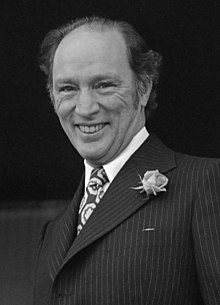 | |
| Premiership of Pierre Trudeau | |
| Monarch | Elizabeth II |
|---|---|
| Party | Liberal |
| Election | |
| Seat | Office of the Prime Minister |
First term April 20, 1968 – June 4, 1979 | |
| Cabinet | 20th Canadian Ministry |
| Appointed by | Roland Michener |
Second term March 3, 1980 – June 30, 1984 | |
| Cabinet | 22nd Canadian Ministry |
| Appointed by | Edward Schreyer |
|
| |
The premiership of Pierre Trudeau occurred from April 20, 1968, to June 4, 1979, and from March 3, 1980, to June 30, 1984. Pierre Trudeau was sworn in as Prime Minister of Canada two weeks after he succeeded Prime Minister Lester B. Pearson as leader of the Liberal Party in the 1968 leadership election.
Trudeau won a comfortable majority government in the subsequent 1968 federal election. In the 1972 federal election, Trudeau's Liberals were reduced to a minority government, though won a second majority in 1974. In the 1979 federal election, Trudeau's Liberals lost power to a Progressive Conservative minority government under Joe Clark. The PC government collapsed in a vote of non-confidence, triggering the 1980 federal election in which Trudeau's Liberals won a third majority. Trudeau is the most recent prime minister to win four elections and to serve two non-consecutive terms. His tenure of 15 years and 164 days makes him Canada's third-longest-serving prime minister.
In domestic policy, Trudeau confronted the Quebec sovereignty movement; he suppressed the 1970 Quebec terrorist crisis by invoking the War Measures Act and in the 1980 Quebec referendum, successfully campaigned against Quebec's proposal to negotiate a sovereignty-association agreement with the federal government. In other domestic policy, Trudeau established a pan-Canadian identity by pioneering official bilingualism and multiculturalism.
Trudeau's government was heavily economically interventionist. He shifted the Liberals to an economic nationalist direction by creating Petro-Canada and the National Energy Program; the latter was heavily opposed by the oil-rich region of Western Canada, leading to the introduction of the term "Western alienation". To combat rising inflation, Trudeau's government enforced wage and price controls from 1975 to 1978 through the passing of the Anti-Inflation Act. After the 1969 budget, Trudeau ran deficits for the rest of his tenure as a result of major increases in public spending; by the time he left office in 1984, the deficit was at $37 billion.
Trudeau pursued an independent foreign policy, distancing Canada from the United States. He differed Canada from other capitalist Western nations by forming close ties with the Soviet Union, China, and Cuban leader Fidel Castro. In 1982, he patriated the Constitution and established the Canadian Charter of Rights and Freedoms, actions that achieved full Canadian sovereignty and ending Canada's 115-year usage of the United Kingdom's constitution.
On June 30, 1984, Trudeau resigned as prime minister, being succeeded by his former Cabinet minister, John Turner.